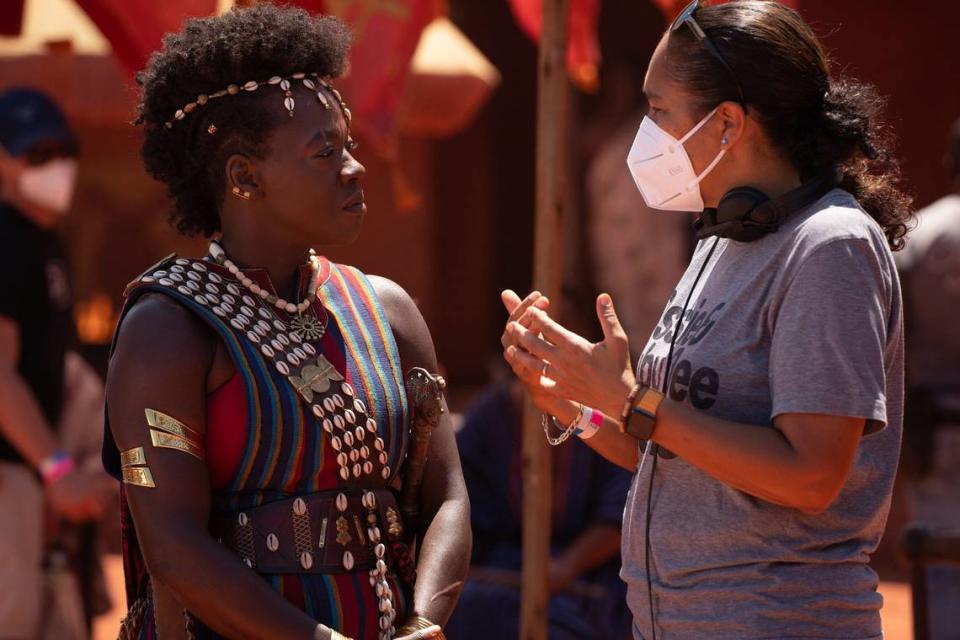The 44 Percent: Florida’s direct file laws, Rosewood & the Oscars
My name is Camellia Burris, and I am an investigative journalist at the Miami Herald. Before becoming a reporter, I worked as an attorney in Chicago and New York City.
Since moving to Miami, I have started investigating Florida’s direct file law — a process that gives prosecutors sole discretion to charge children as adults without a judge playing any role. Based on my preliminary research, Black children constitute the majority of youth transferred out of juvenile court.
Florida is among a small minority of states that employ direct file laws. According to the Southern Poverty Law Center, in the last five years, Florida prosecuted 4,446 children as adults.

Between the fiscal years 2020 to 2021, there were 19,086 juveniles arrested statewide; 46% were Black, 37% were white and 16% were Latinx. Yet, Black juveniles comprised 61% of the children transferred to adult courts, compared to white children comprising 25% and Latinx making up 14% of these transfers.
I am interested in investigating how the criminal justice system disproportionately impacts Black people. If you have any tips or questions I can be reached at cburris@miamiherald.com.
INSIDE THE 305

‘Everything was intentionally erased.’ Miami museum exhibit recounts Rosewood massacre:
The Rosewood Massacre is something that doesn’t get discussed enough.
For those that don’t know, Rosewood was a town in Central Florida that the Ku Klux Klan destroyed in 1923 after a white woman falsely accused a Black man of assaulting her. At least 8 people — six Black, two white — died. If not for the work of Lizzie Robinson, a descendant of a Rosewood survivor and founder of The Real Rosewood Foundation, the story might never have been told.
“I took the story to school with me, to college, to work and it just became a part of who I am today,” the 84-year-old Jenkins, founder of The Real Rosewood Foundation, said to an audience Wednesday at Florida International University at the opening of An Elegy to Rosewood, a new exhibit on display at the Frost Art Museum.

How this Black-owned golf apparel brand is trying to bring equity to the sport:
Golf is a white sport.
But it doesn’t have to be, according to Eastside Golf, a brand intent on injecting some equity to the sport.
“Our tagline is ‘be authentic’ so if we continue to be authentic and then just continue to bring people into the game that want to be themselves,” said Olajuwon Ajanaku, who founded the company in 2019. The brand is easily identified by their logo — a Black man in a sweatshirt, jeans and a thick gold chain swinging a golf club — which has shown the world “there’s power in representation.”
I profiled Ajanaku and Eastside Golf co-founder Earl A. Cooper at the Miami Springs Golf Course, South Florida’s first desegregated course, where we discussed the history and future of the sport.
OUTSIDE THE 305

Lawyers have 3 students ready to sue if Florida bans African-American Studies AP class:
On Wednesday, Black Floridians made it very clear how they felt about Gov. Ron DeSantis’ recent rejection of Advance Placement African American studies courses.
“If he does not negotiate with the College Board to allow AP African-American Studies to be taught in the classrooms across the state of Florida, these three young people will be the lead plaintiffs,’’ said Tallahassee civil rights attorney Ben Crump, who has represented families in several high-profile civil rights cases.
Last week, Florida sent a letter to the College Board about the state’s rejection of the course, explaining that it “lacks educational value.” DeSantis called some of the course’s topics an attempt at “indoctrination.” A new version of the AP course is expected to be released Feb. 1 yet people like Rep. Fentrice Driskell, a Tampa Democrat, are hesitant about the changes.
“We’ve been told that this AP African-American history course will be altered and resubmitted, and most likely they’ll make enough changes for the governor to approve it, but at what cost?” she asked. “And are we really OK with Ron DeSantis deciding what’s acceptable for America’s students across the country about Black history?”

Meet the Black professor intent on ignoring DeSantis’ restrictive education laws:
Marvin Dunn, a professor emeritus at Florida International University, has made it his mission to uncover Florida’s dark history. To that end, he recently began statewide “Teach the Truth” tours where the octogenarian takes high school students to the places that some of Florida’s worst instances of racial violence occurred.
“Almost all of Florida’s painful racial past has been whitewashed, marginalized or buried intentionally,” Dunn wrote. “But I was born here. I know Florida’s flowers and her warts.”
More than two dozen students from Miami traveled on Dunn’s first tour in January when he went to the home of Harry T. Moore and Harriette V.S. Moore, who were killed Christmas Day 1951, and Rosewood. Another tour is expected to happen in the spring.
HIGH CULTURE

The Oscars announced nominations this week and — surprise, surprise — Black women are not getting recognized.
Case in point: “The Woman King.”
“The Woman King” is the perfect representation of what happens when a talented director and exceptional actor are given the resources and support to dedicate their full selves to a project they believe in. Which is why it’s so disappointing to see the Oscars blatantly ignore such an excellent film and set up another “all-male nominee” moment in Best Director. The snub feels even more frustrating alongside the lack of any Black nominees in the Best Actor or Actress sections, including Danielle Deadwyler’s omission for her heartbreaking turn as Mamie Till in “Till.”
Where does “The 44 Percent” name come from? Click here to find out how Miami history influenced the newsletter’s title.

